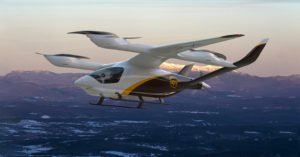
For the drone industry, the decision could indicate the future of drone delivery in the supply chain on a large scale. “BETA’s aircraft are designed to someday operate autonomously as technologies and regulations are established, ” says the announcement. “UPS Flight Forward received the first U.S. Federal Aviation Administration (FAA) Part 135 Standard air carrier certification to operate a drone airline, and is operating daily revenue-generating flights with drones. The FAA certification also enables UPS Flight Forward to fly payloads of up to 7,500 lbs. either with an operator or autonomously.”
The BETA aircraft have a 1,400-pound cargo capacity, and can quickly transport deliveries that would otherwise fly on small fixed wing airplanes. UPS says that the VTOL aircraft will serve healthcare providers, small and medium-sized businesses, and other companies in small communities. “With a 250-mile range and cruising speed of up to 170 miles per hour, UPS will be able to plan a series of short routes, or one long route, on a single charge to meet customers’ needs,” the release explains.
“This is all about innovation with a focus on returns for our business, our customers, and the environment,” said UPS Chief Information and Engineering Officer Juan Perez. “These new aircraft will create operational efficiencies in our business, open possibilities for new services, and serve as a foundation for future solutions to reduce the emissions profile of our air and ground operation.”
“We’re combining simple, elegant design and advanced technology to create a reliable aircraft with zero operational emissions that will revolutionize how cargo moves,” said BETA founder and CEO Kyle Clark. “By utilizing vertical takeoffs and landings, we can turn relatively small spaces at existing UPS facilities into a micro air feeder network without the noise or operating emissions of traditional aircraft.”
UPS also plans to use BETA’s recharging station, which can recharge the aircraft in under an hour, enabling a quick turnaround for loading and unloading of cargo.
BETA plans to deliver the first 10 aircraft in 2024. The company completed an interstate flight from its Plattsburgh, NY test facility to its Burlington, VT headquarters last month.

Miriam McNabb is the Editor-in-Chief of DRONELIFE and CEO of JobForDrones, a professional drone services marketplace, and a fascinated observer of the emerging drone industry and the regulatory environment for drones. Miriam has penned over 3,000 articles focused on the commercial drone space and is an international speaker and recognized figure in the industry. Miriam has a degree from the University of Chicago and over 20 years of experience in high tech sales and marketing for new technologies.
For drone industry consulting or writing, Email Miriam.
TWITTER:@spaldingbarker
Subscribe to DroneLife here.